Iranian MP Reports Purge Of School Administrators
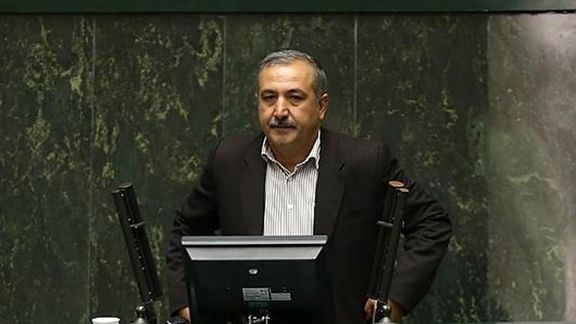
An Iranian Member of Parliament has exposed a widespread campaign of purges, suspensions, and dismissals affecting school administrators across the country.

An Iranian Member of Parliament has exposed a widespread campaign of purges, suspensions, and dismissals affecting school administrators across the country.
Jalal Mahmoudzadeh, speaking on Sunday, provided alarming statistics, stating that approximately 15,000 to 20,000 school administrators have been replaced since the appointment of Reza Morad Sahraei as the Minister of Education.
The "purification process," as described by the MP, has extended its reach from universities to the education sector, resulting in the sidelining of teachers, school administrators, and even the expulsion of professors. The campaign shows no signs of slowing down.
The developments come on the heels of Reza Morad Sahraei's announcement last month that a "transformation plan" would be implemented in 5,000 schools during the current Iranian year, scheduled to conclude on March 20, 2024. The plan was initiated after a wave of anti-government protests involving numerous school students. Sahraei has committed to ongoing changes and expansion of the program.
The term "political purification," widely discussed in Iranian media, extends beyond educational institutions. Various organizations and institutions have faced similar purges as hardline elements of the regime sideline their rivals. The notion of "purification" was initially coined by former Parliament Speaker Ali Larijani to describe the actions of ultraconservative allies of President Raisi, aiming to consolidate government power by marginalizing other politicians and officials.

Security forces have arrested an unknown number of people who attended the funeral of Armita Geravand, the latest victim of Iran’s hijab enforcement.
The Iranian teenager died Saturday after about a month in coma for brain damage she suffered during a violent encounter with hijab enforcers deployed at Tehran’s subway stations. Her body was laid to rest at Tehran’s Behesht-e Zahra cemetery amid a heavy security presence.
Hengaw, a Kurdish human rights group, said Sunday that several of Armita’s relatives were arrested at her funeral service while the participants chanted against the regime. Her body was reportedly not released to the family until the security apparatus made sure that her family home, the hospital where she died and her burial site were surrounded by security agents.
At the funeral, not only were security forces stationed at the burial site, but at least three 360-degree cameras were installed there to record the service and detect anyone speaking against the government. Agents, who hugely outnumbered the funeral participants, also prevented people from recording the event and confiscated cell phones of the participants who tried to film the funeral.
It remains unknown what exactly happened on October 1 when Armita was confronted by morality police. The regime released doctored footage of her at the subway to exonerate its hijab enforcers. The widely accepted narrative is that a woman agent pushed her, and Armita fell and hit her head on the ground. However, authorities seem to have failed to convince Iranians, who believe hijab enforcers were responsible for her death. Authorities claim her head injury was caused by low blood pressure and fainting.
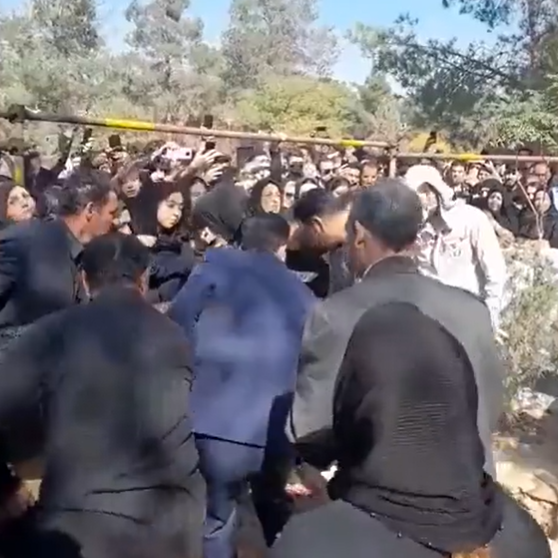
To prevent the repeat of anti-regime protests sparked by the death of Mahsa Amini at the hands of hijab police, Iranian authorities have imposed a full ban on reporting about Armita's death. Following the death of Mahsa Amini in September 2022, the Iranian clerical regime is worried about a resurgence of the extended anti-establishment protests and the 'Women, Life, Freedom movement' seen last year.
The circumstances of this latest case closely resembles that of Amini. In both instances, the regime denied any wrongdoing but pressured the families to refrain from speaking to the media.
The death of Armita has reignited anti-regime sentiments with people starting chanting slogans from their rooftops and windows on Saturday night.
Narges Mohammadi, the imprisoned human rights activist who recently received the Nobel prize for peace, issued a statement from prison saying, “Armita, full of the zest of life, was sent to her death because she had no intention of concealing her beautiful hair under compulsory hijab rules."
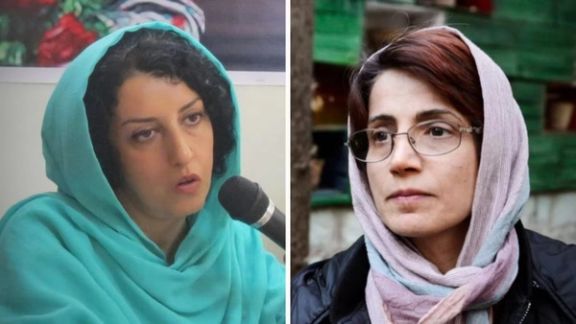
Prominent female dissident Zahra Rahnavard, under house arrest since 2011 along with her husband Mir-Hossein Mousavi as leaders of Iran's anti-regime Green Movement, warned the Islamic Republic against fighting against Iranian women and girls. She called on the regime to abolish the "wretched law of compulsory hijab," or the "stigma of suppressing girls will remain on their foreheads forever." Rahnavard stated that the rulers of Iran see their survival in the enforcement of mandatory hijab. The Green Movement emerged after the disputed 2009 presidential election, demanding the annulment of Mahmoud Ahmadinejad's re-election.
Prominent lawyer and rights defendant Nasrin Sotoudeh said in a statement, "Once again, another regime-sanctioned murder, this time of Armita Geravand, a murder that every Iranian feels very close to." She also called on people to hold rallies at subway stations “to protect our youth.” According to information obtained by Iran International, Sotoudeh was arrested Sunday at Armita's funeral.
Prominent expatriate opposition figures including Nobel Laureate Shirin Ebadi, Canada-based Hamed Esmaeilion, exiled Crown Prince Reza Pahlavi, and the US-based activist Masih Alinejad have also condemned the killing of Armita Geravand.
Pahlavi, who has become a leading opposition figure since the Women, Life, Freedom protests broke out, said, “Those who killed Armita are the same ones who killed Mahsa Amini, the same ones who killed Majid Reza Rahnavard, the same ones who killed 1,500 in November 2019, the same ones who killed our youth in December 2017, the same ones who killed Neda Agha Soltan, the same ones who killed Fereydoun Farrokhzad, the same ones who killed Shahriar Shafiq, the same ones who killed Farrokhro Parsa…”
“The battle between us and them is a battle between good and evil, and until we win this battle, they will kill us and there will be no justice. Onward, together, towards victory for Iran,” he added.
Iranian expatriate communities also held anti-regime demonstrations in memory of Armita in several cities around the globe, such as Hamburg and Frankfurt in Germany, Vancouver in Canada, and Stockholm in Sweden.
Reactions to Armita’s death are also pouring in by foreign officials. The US special envoy for Iran, Abram Paley, said, “Iran’s state-sponsored violence against women and girls has been devastating for so many families in Iran and abroad.”
German member of the European Parliament, Hannah Neumann, said that Armita was killed “because some Islamist regime thinks it is okay to beat children to coma for not wearing hijab. A regime that betrays its youngest has no future.” She also claimed that “The regime wanted to pick a moment where global attention is elsewhere to announce her death," referring to the Hamas-Israel war, a bloody conflict fueled by the regime.
German Foreign Minister Annalena Baerbock said, “Armita was only 16. A child, a student with a whole life still ahead of her. The brutality of the regime has robbed her of her future.” She added, “The future of Iran is its youth. The future of Iran is its women. The regime cannot suppress their desire for freedom.”
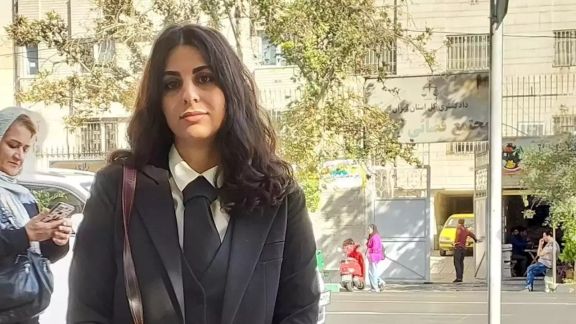
Anti-hijab activist Sepideh Rashno has been sentenced to six months' imprisonment in her latest case amid Iran's hardening hijab laws.
The young woman was denied a presence at her own trial in Tehran after announcing on social media that she would not wear hijab at the court.
She has also been fined 10 million Iranian rials in cash and banned from using Instagram for one year. Her current Instagram page was banned entirely.
It is the hijab rebel's second time in prison, first arrested in July last year after a video of her quarrel with a woman verbally assaulting her for being unveiled on public transport went viral, long before the national uprising of the Women, Life, Freedom movement.
She was later forced into a televised confession, clearly bruised, showing signs of torture. At the time, the US-based Human Rights Activists News Agency said she was taken to hospital with internal bleeding shortly after her arrest and before her appearance on television, when she was covered with her mandatory hijab.
She was released from Tehran’s Evin prison after about 40 days with a bail of what is believed to be $27,000, a huge sum for ordinary Iranians already forced into dire economic straits in a flagging economy.
The young writer and translator was initially convicted of "association and collusion with the intent of endangering national security" and "propaganda against the Islamic Republic," resulting in a five-year suspended prison sentence in December. However, she faced fresh charges of "promoting moral corruption" and "propaganda against the regime" after sharing a photo without hijab on social media.
Rashno revealed on Sunday through her Instagram account that the new sentence effectively ends the suspension of three years and seven months from her initial case. Consequently, she now faces a total of four years and one month of imprisonment.
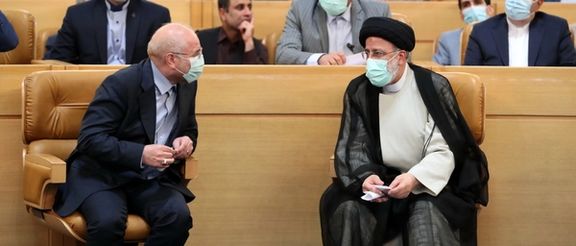
In the midst of the Islamic Republic's political landscape, a Shakespearean drama unfolds, with top characters from within Supreme Leader Ali Khamenei's inner circle.
The central figures in this unfolding narrative are President Ebrahim Raisi, Khamenei’s obedient, handpicked functionary, and former police chief and air force pilot, IRGC General Mohammad Bagher Ghalibaf, who has transitioned into politics, most recently holding the position of Speaker of the Iranian Parliament (Majles).
This ongoing rivalry between the two protagonists is characterized by a level of animosity that seemingly leaves no room for compromise, resembling a "it's either me or you, or both of us must fall" scenario.
Superficially, the drama, as explained in a Khabar Online report, revolves around, among other things, the parliament rejection of the President Raisi's seventh five-year development plan and changes to the government's Hijab law beyond recognition. According to Khabar Online, the Majles has handled government bills in a manner that suggests a lack of faith in the Raisi administration's ability to draft effective legislation.
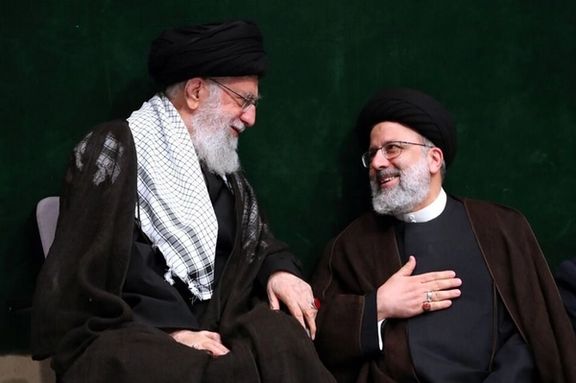
In recent months, Raisi has written several letters to Khamenei, expressing his grievances regarding the parliament and its Speaker's conduct. Other high-ranking officials, such as Expediency Council Chief Sadeq Amoli Larijani, have also noted that Raisi tends to seek solutions from Khamenei for his government's issues with other officials.
However, it is no simple task the Supreme Leader to decide about the dispute between two of his key obedient officials. Previous governments did not unquestioningly implement all of Khamenei's orders and shoulder all the blame for policy failures without complaint.
Furthermore, Ghalibaf is not just a regime member; he is also a relative who holds a closer connection to Khamenei's wife and his ambitious son, Mojtaba. This dynamic makes it exceedingly challenging for Khamenei to discipline Ghalibaf, who has demonstrated unwavering loyalty when it comes to suppressing dissent and protests, regardless of his government position.
At a deeper level, however, the antagonism is something more than administrative and legislative disputes between the heads of two of the three branches of the Islamic Republic government.
Based on other Iranian media reports, Ghalibaf has still not stomached the fact that he was forced by Khamenei's office to step down as the most popular conservative candidate in the 2017 presidential election in order to raise Raisi's profile and give him a chance to win the election against moderate Hassan Rouhani. During that election, the ultraconservative Paydari Party decided to take advantage of Ghalibaf's absence and continued to support its own candidate, former nuclear negotiator Saeed Jalili, in competition with Raisi and Rouhani.
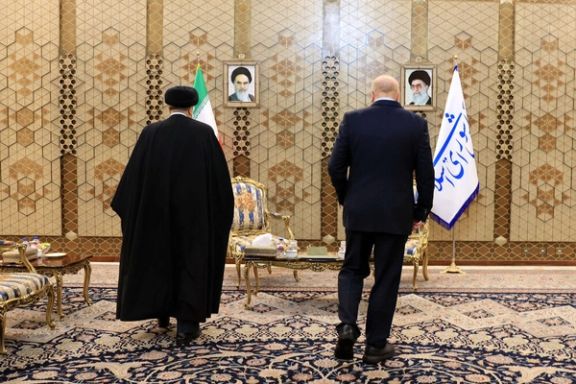
Paydari Party was convinced that Ghalibaf was the most popular candidate among the trio and believed that in his absence their candidate Jalili was able to win the election. But as it turned out, not only he failed to win the election, his instance on remaining in the race fragmented the conservative vote, leading to Hassan Rouhani’s victory. Ghalibaf's hard feelings against Raisi and Jalili has continued to date.
Reports suggest Paydari is actively preparing candidates for both the parliamentary elections in March 2024 and the presidential election in June 2025. The party's ideal candidate for the parliament is Paydari leader Sadeq Mahsouli, and its man to compete for the next presidency is no one other than Saeed Jalili.
Paydari's hope to win the Majles and the post of its speaker appears to be more realistic than its plans for presidency. Although almost every politician in Iran agrees that Raisi's track record in his first four years in office leaves no room for his at the presidential office in 2025, there is no indication yet of Khamenei's inclination to kick Raisi out of the core of his government. Against all odds, he is more likely to be allowed to run and win the next presidential elections.
While Paydari's prospects for winning the Majles and securing the Speaker's position appear promising, their presidential ambitions are more challenging. Although most Iranian politicians agree that Raisi's track record during his first term leaves little room for his re-election in 2025, there are no indications of Khamenei's inclination to oust Raisi from the heart of his government. Despite the odds, Raisi is more likely to be permitted to run and potentially win the next presidential election.
However, Paydari has previously demonstrated its power to secure the Speaker's position in the Majles. Currently, Ghalibaf has retained this role by making several concessions, including assigning all presidium positions to Paydari. Nevertheless, relations between the party and Ghalibaf have deteriorated, and Ghalibaf prefers to run for the presidency rather than remain a member of the parliament. As far as he is concerned, post-2025, it will be either him or Raisi in the political spotlight.
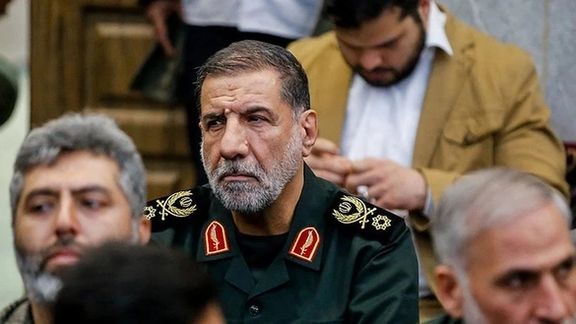
An Iranian MP has accused the United States' CENTCOM of directing military operations in the ongoing Gaza conflict.
Esmail Kosari, a member of the National Security and Foreign Policy Commission of the Iranian Parliament and a commander in the Islamic Revolutionary Guard Corps (IRGC) stated, "the crimes that America is currently committing are more repugnant than Israel's because the command of the crimes lies with CENTCOM."
The claims follow Iran-backed Hamas' declaration of war on October 7, when thousands of its militia invaded Israel by air, land and sea, killing at least 1,400 and taking 230 hostage in Gaza, including women and children. While Iran denies directing the operation, it funds Hamas at least $!00m a year and backs it with the likes of military and technical support and training.
The US was quick to back Israel's right to defend itself, offering its support and sending warships to the region as Iran's leaders rallied its regional proxies to ready for a multifront conflict, but has called for calm in a bid to prevent regional escalation.
Kosari's unsubstantiated allegations claimed that the “lack of a cohesive spirit within the Israeli regime prompted the US to send CENTCOM commanders to Gaza to direct military operations” though there is no US presence in Gaza, which is solely controlled by Hamas, designated by the US, EU and UK.
His comments come at a time when US facilities in the region have come under increasing attacks from Iran-backed proxies and fears of its largest proxy, Hezbollah, joining the war, are ever present.
Just days ago, Iran's Foreign Minister Hossein Amir-Abdollahian issued a warning regarding the United States' support for Israel during his visit to New York to attend a special session of the United Nations General Assembly.
In an interview with Bloomberg Television from Iran's mission to the UN in New York, he warned, "The US is advising others to show self-restraint, but it has sided with Israel totally."
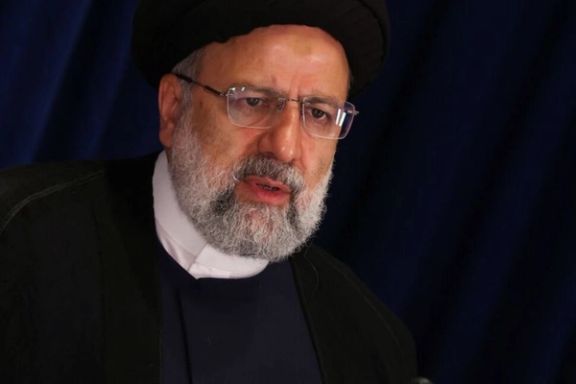
Iranian President Ebrahim Raisi issued renewed threats to Israel and the US after Israel launched a ground offensive in Gaza against Iran-backed Hamas.
"The Zionist regime's crimes have crossed the red lines, which may force everyone to take action," he said, suggesting once again the threat of action from its proxies in the region.
"Washington asks us to not do anything, but they keep giving widespread support to Israel," Raisi stated in his post on X on Sunday morning.
Iran's proxies have continued to target US facilities in the Middle East since the war declared by Hamas broke out on October 7 after its elite forces invaded Israel, killing at least 1,400 and kidnapping at least 230. Its Yemeni proxy, the Houthis, even fired rockets towards Israel, intercepted by the US and Saudi Arabia.
IDF spokesman Daniel Hagari confirmed the ground invasions, explaining they are being carried out "in a phased manner". He said, "This will take time."
Denying its hand in the ever heightening regional tensions, the Iranian president claimed its proxies are "independent" and "do not receive any orders from Tehran", blaming the US.